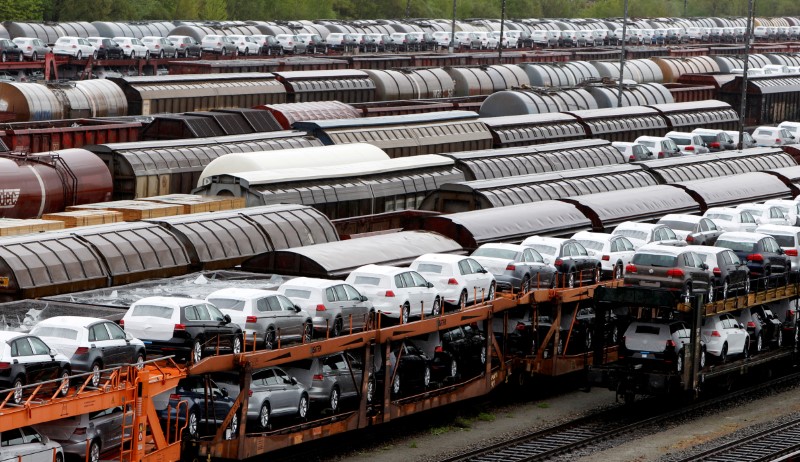By Joseph Nasr
BERLIN (Reuters) - German imports fell more sharply than exports in June, pushing the trade balance to a 10-month high, data showed on Tuesday.
The data are likely to increase criticism of conservative Chancellor Angela Merkel, who is expected to win a fourth term in an election next month, for not boosting investments enough as a way to increase imports and support other countries.
Seasonally adjusted exports dropped by 2.8 percent, the sharpest fall since August 2015 that ended five consecutive months of growth. Imports were down 4.5 percent, the biggest drop since January 2009, data from the Federal Statistics Office showed.
Both figures confounded expectations in a Reuters poll that had pointed to exports edging down 0.3 percent and imports rising by 0.2 percent.
Analysts interpreted the drop in both exports and imports as a technical correction after five months of growth fuelled by strong demands for German goods from within and outside of the euro zone.
"The upward trend remains intact," said Andreas Rees of Unicredit (MI:CRDI). "The world economy should continue its recovery and Germany should strongly profit from this in the second half of the year even if the euro zone recovery slows."
The seasonally adjusted trade surplus widened to 21.2 billion euros from 20.3 billion euros in May, reaching its highest level since August 2016. The June reading was higher than the Reuters consensus forecast of 21.0 billion euros.
Germany's wider current account surplus, which measures the flow of goods, services and investments, rose to 23.6 billion euros after a downwardly revised reading of 16.0 billion euros in May, unadjusted data showed.
The figures are likely to prompt more criticism of Germany's export strength after the International Monetary Fund last month repeated its call for the government to increase investment as a way to reduce its current account surplus, increase imports and support the economic recovery in other countries.
The German government forecasts the economy to grow 1.5 percent this year, down from 1.9 percent in 2016, which was the strongest rate in five years.
Construction, consumption and state spending have been providing most of the growth impulse, supported by the low interest rate environment created by the European Central Bank.
Data published last week pointed to the growth momentum in Germany to continue.
Industrial orders rose twice as much as expected in June, supported by strong domestic demand. Industrial output fell unexpectedly for the first time this year, but analysts said the drop was not a signal that the growth momentum was weakening.
"Even though this morning’s trade data add to a disappointing month for the German industry, we don’t think that the German economy has suddenly passed its peak," ING Bank economist Carsten Brzeski said.

He added: "Instead, strong confidence indicators point to a continuation of the recovery. Also, some kind of investment boost after the elections combined with the gradual recovery of private investment already this year should extend an already mature business cycle of the German economy well into 2018."